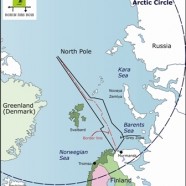There is movement in the Arctic
On July 7th 2011 a maritime border agreement between Russia and Norway entered into force. This new dividing line ends a 44 year dispute over 175,000 square kilometres in the Barents and Arctic seas and opens up the former so called “grey zone” for exploration. The day following the entry into force Norway deployed the Harrier Explorer (Imo 7807380) a seismic vessel to start exploration in the zone.
This border agreement follows a Treaty on Cooperation on Aeronautical and Maritime Search and Rescue in the Arctic on May 12th 2011. It is the first legally binding treaty under the circumpolar intergovernmental forum the Arctic Council and was signed in Nuuk Greenland by Canada, Denmark, Finland, Iceland, Norway, Russia, Sweden and the United States of America. The Treaty so called the “Nuuk Agreement” is focused on saving lives. It is an important step towards policy-making as there is an increasing amount of traffic venturing into the Arctic, which includes tankers and passenger ships of which a number were not constructed to navigate in ice-covered waters.
A new contaminated site in Arctic ? (*)
Since Friday 27th August, the Arctic Ocean is threatened by the Clipper Adventurer. This ferry converted into a cruise ship was built in 1975 in ex-Yugoslavia. She is flying the Bahamian flag. She ran aground a reef along the Nunavut shoreline. Salvage operations are considered.
The state of Bahamas has not signed the MARPOL annex IV on the prevention of pollution by sewage from ships. The owner is based in Miami.
This warning incident demonstrates that all nautical and juridical precautionary measures are not implemented to avoid pollution in the Arctic Ocean.
A new contaminated site in Arctic ? (*)
Since Friday 27th August, the Arctic Ocean is threatened by the Clipper Adventurer. This ferry converted into a cruise ship was built in 1975 in ex-Yugoslavia. She is flying the Bahamian flag. She ran aground a reef along the Nunavut shoreline. Salvage operations are considered.
The state of Bahamas has not signed the MARPOL annex IV on the prevention of pollution by sewage from ships. The owner is based in Miami.
This warning incident demonstrates that all nautical and juridical precautionary measures are not implemented to avoid pollution in the Arctic Ocean.
Polar Star n°2, 2750 polluted sites in the Arctic – 2009
 n°2
n°2
2750 polluted sites in the Arctic
The cold temperatures and permafrost have been considered by Arctic countries as a mode of confinement and an eternal repository for pollutants. But for several years, it has been known that rivers, lakes, and groundwater have been contaminated by the migration of pollutants originating from landfills and other contaminated sites. This mobilization of pollution comes from temperature fluctuations, melting snow, rain, changing levels of groundwater and flooding. The ice has not fulfilled its purpose as a cocoon in trapping pollutants. With global warming in view, the progressive rupture of the “cold chain” would be an ecological disaster and would accelerate the release of waste.
Polar Star n°2, 2750 polluted sites in the Arctic – 2009
 n°2
n°2
2750 polluted sites in the Arctic
The cold temperatures and permafrost have been considered by Arctic countries as a mode of confinement and an eternal repository for pollutants. But for several years, it has been known that rivers, lakes, and groundwater have been contaminated by the migration of pollutants originating from landfills and other contaminated sites. This mobilization of pollution comes from temperature fluctuations, melting snow, rain, changing levels of groundwater and flooding. The ice has not fulfilled its purpose as a cocoon in trapping pollutants. With global warming in view, the progressive rupture of the “cold chain” would be an ecological disaster and would accelerate the release of waste.









